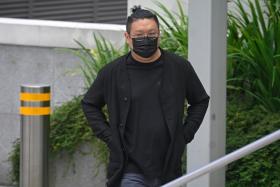Court grants bid by son, 26, to end trust for $4.9m house, rejects dad’s claim it was ploy to avoid ABSD
A 26-year-old whose parents set up a trust for a $4.9 million house that was to be transferred to him when he turns 40 will be able to get the property immediately, after he succeeded in his court bid to terminate the trust.
Mr Alistair Lau wanted to terminate the trust to prevent more disputes between his estranged parents and to ensure that he, his mother and his sister will have a place to stay after his parents’ divorce is finalised.
His father Richard Lau objected to the trust being terminated, arguing that it was illegal as it was a sham to avoid paying additional buyer’s stamp duty (ABSD).
In a written judgment on Friday, Judicial Commissioner Goh Yihan ruled in favour of the son, concluding that the trust deed was a genuine document that was meant to benefit Mr Alistair Lau.
Mr Richard Lau and Madam Cynthia Sng, who were in their mid-50s at the time, entered into an option to buy the property for $4.925 million in July 2020. Funds for the purchase were raised through various loans, which were eventually repaid through the sale of three other properties and by liquidating several of the couple’s assets.
That same month, the couple also hired a lawyer to draw up a trust deed to state that they were holding the property as joint trustees for the sole benefit of their only son, the elder of their two children.
In 2021, the couple’s relationship turned rocky. Madam Sng filed for divorce while Mr Richard Lau moved to a Lorong Ah Soo flat.
In 2022, Mr Alistair Lau applied for a High Court declaration that the deed be terminated and the property be vested in him immediately.
He relied on the rule, established in a leading English case, that a sole beneficiary of a trust who has reached full age and does not suffer from any mental disability is entitled to terminate the trust.
Madam Sng did not object to his application. She agreed with her son that she and her husband had created the trust to gift him a legacy property while they were still alive.
However, Mr Richard Lau disputed the purpose of the trust. He alleged that it was created because the couple thought it would be better for their son to be the beneficial owner of the property so that they could “buy time” to dispose of their other assets and avoid the hefty ABSD that they could not afford.
As Singaporeans who owned more than two properties at the time of the purchase, the couple would have had to pay ABSD at the rate of 15 per cent, which amounted to $738,750.
He claimed that their lawyer advised them that the trust could easily be “collapsed” after four years and that the couple could “take back” the property if they wanted.
But Madam Sng said the “collapse” referred to the lawyer’s advice that their son can legally ask for the property to be transferred to him before the age of 40.
In his judgment, the judicial commissioner said Mr Alistair Lau fulfilled the legal requirements to have the property transferred to him as he was an adult and a psychiatrist certified that he is not suffering from any mental disability.
The judicial commissioner said the evidence showed that the couple had intended to set up a trust to benefit their son. There was no credible evidence that the couple would have been unable to afford the ABSD, he added.
The judicial commissioner said the couple signed the deed despite knowing that the trust could be collapsed by their son.
He highlighted how Madam Sng’s version of events was supported by a contemporaneous note that the lawyer had advised the couple that their son could collapse the trust before he turned 40.
“The fact that the trust arrangement additionally allowed the respondents to save on ABSD is an incidental benefit that does not detract from their overall intention to gift their elder child and only son a legacy property while both of them were still living,” he added.
Get The New Paper on your phone with the free TNP app. Download from the Apple App Store or Google Play Store now


